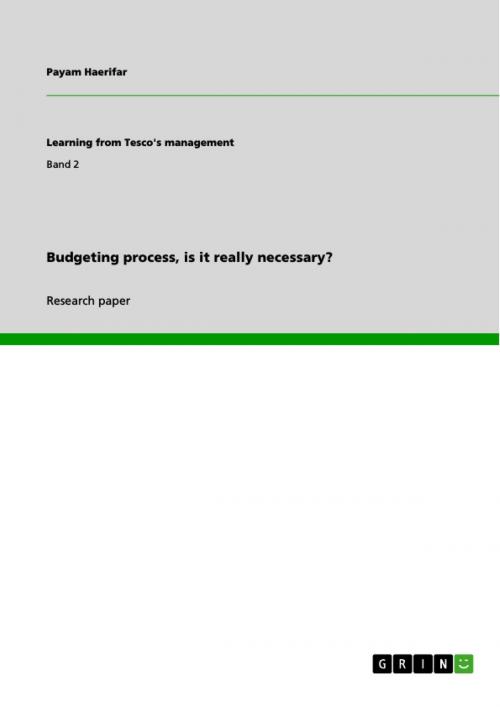| Author: | Payam Haerifar | ISBN: | 9783656110378 |
| Publisher: | GRIN Publishing | Publication: | January 25, 2012 |
| Imprint: | GRIN Publishing | Language: | English |
| Author: | Payam Haerifar |
| ISBN: | 9783656110378 |
| Publisher: | GRIN Publishing |
| Publication: | January 25, 2012 |
| Imprint: | GRIN Publishing |
| Language: | English |
Research Paper (undergraduate) from the year 2012 in the subject Business economics - Accounting and Taxes, University of Derby, language: English, abstract: The strategic planning is the long-term plan of organisations and budget is the short-term plan that contains more detail regarding to business operations. The budget is like a blueprint for entire business which is prepared for the next year. So it is designed by estimating and forecasting future trends in market. Budget is used to evaluate actual performance of a company or a section of company with desirable performance that this desirable performance is based on forecasting markets. Therefore, an excellent budget process should have this ability to convert objectives and desirable goals (it means future estimated outcomes) into data. This statement could be wrong in some situations. Various scholars provide opposites arguments regarding to this statement. Beneath the main body these two arguments against and in favour of this above statement are discussed abundantly. One of the main success elements of budget is finding the right resource to implement the budget calls for extensive use of human resources. But sometimes even with the appropriate and well-designed budget it is not possible to reach budget's targets because of human resource or their misunderstanding of budget. Organisations try to have correct congruence perceptions within their employees but some researches demonstrate different outcomes (perception) may be exhibited when the individuals have not parallel objectives compare to organisational goals. These two main issues of budgeting success factors are mentioned in this writing; besides, one of the main differences between imposed budgeting and participatory budgeting is mentioned in this study. This difference is regarding to the way of communication.
Research Paper (undergraduate) from the year 2012 in the subject Business economics - Accounting and Taxes, University of Derby, language: English, abstract: The strategic planning is the long-term plan of organisations and budget is the short-term plan that contains more detail regarding to business operations. The budget is like a blueprint for entire business which is prepared for the next year. So it is designed by estimating and forecasting future trends in market. Budget is used to evaluate actual performance of a company or a section of company with desirable performance that this desirable performance is based on forecasting markets. Therefore, an excellent budget process should have this ability to convert objectives and desirable goals (it means future estimated outcomes) into data. This statement could be wrong in some situations. Various scholars provide opposites arguments regarding to this statement. Beneath the main body these two arguments against and in favour of this above statement are discussed abundantly. One of the main success elements of budget is finding the right resource to implement the budget calls for extensive use of human resources. But sometimes even with the appropriate and well-designed budget it is not possible to reach budget's targets because of human resource or their misunderstanding of budget. Organisations try to have correct congruence perceptions within their employees but some researches demonstrate different outcomes (perception) may be exhibited when the individuals have not parallel objectives compare to organisational goals. These two main issues of budgeting success factors are mentioned in this writing; besides, one of the main differences between imposed budgeting and participatory budgeting is mentioned in this study. This difference is regarding to the way of communication.















